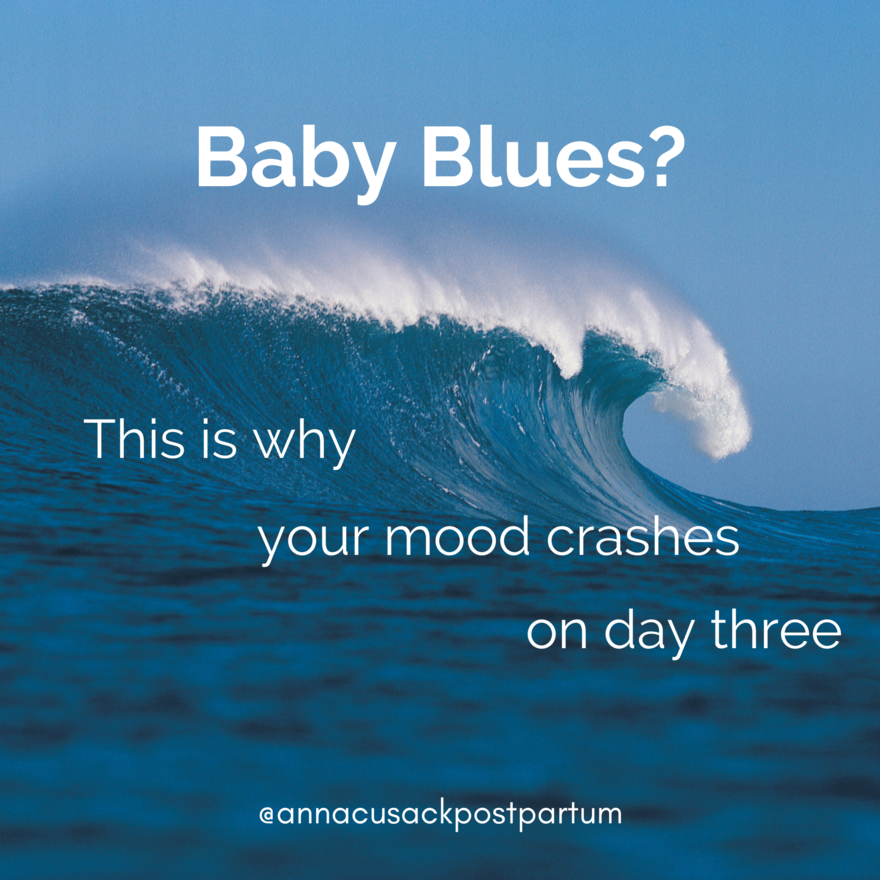Baby Blues? This is why your mood crashes on day three

Many mums experience a glistening high or adrenalin rush the first couple of days post-birth. Sometime around day three to five, they suddenly feel like they've been hit by a steamroller. Tiredness catches up with them and they can feel fragile, teary and a little lost in her new role. Mama's mood slumps, she may be irritable or have difficulty sleeping, and she can start to question herself - am I really cut out for this? Here's what is actually happening behind the scenes hormonally.
During pregnancy your oestrogen and progesterone levels skyrocket. In late pregnancy, these hormones help to expand the uterus, build the uterine lining, sustain the placenta and prepare the mammary tissues for breastfeeding. These hormones are also part of the mood protection system we have during pregnancy to dampen our responses to external stresses, turn inward to prepare mentally and engage in 'nesting'. After birth (specifically the delivery of the placenta) oestrogen and progesterone levels drop to ground zero, taking your elevated mood with them.
BUT all is not lost! During pregnancy, your brain has deposited extra receptors for the feel-good, bonding hormone oxytocin in your brain, right near your stress centre (you can read more about this in my previous blog on "baby brain"). Each time you experience a "let down" when breastfeeding (the "milk ejection reflex), feel nurturing touch like a shoulder rub, receive a lovely hug, feel really listened to, or get reassuring eye contact, your brain will get a hit of oxytocin. By breastfeeding on demand (i.e. A LOT), resting and being cared for, your body will keep getting little hits of love hormone oxytocin until oestrogen and progesterone start to build back up again. Baby blues are temporary and are usually remedied within two or three weeks.
BUT it takes someone giving you that loving support, providing you with backup, to get through this period and allow oestrogen and progesterone to come back online at all. This is why building your village, getting your inner circle of support (e.g. your partner, a best friend) on the same page, and really investing in support services so you can feel loved up and rest is essential, not optional! As a postpartum support professional I am here for exactly this purpose! Some mums like to engage my support when their partner has gone back to work, whereas others like to have me visit while their partner, mother, friend etc. is present so they can enjoy bonding time with the baby and I can really hone in on mama care (like massage, warming belly wrapping or pelvic floor rehab).
I can tag in with you whether your baby is inside or earthside, but having a consult during pregnancy and getting a plan in place can be super valuable. If you're considering in-home postpartum support I'd encourage you to book a no-obligation, free consult with me. And if you want to get into the nitty gritty of hormones and the science side of things, you'd be wise to join "Prepared, Together", my six week parent prep program. One of our guest presenters is maternal health physician Dr Oscar Serrallach, who has written a book based on the biology of postpartum and how to avoid and cure postnatal depletion. The next course starts August 3, $247 AUD with payment plan option available.
If you feel like the "baby blues" are sticking around too long, you are unable to feel love or enjoyment in your baby or are feeling anxious or angry, it is wise to check in with a trusted friend and/or a professional. PANDA (www.panda.org.au) and the Centre of Perinatal Excellence (www.cope.org.au) have mental health resources and phone support lines for both parents. Your GP or a trained counsellor or psychologist is also a good place to start getting the support you need to get better. Postnatal mood disorders are common but not normal, you do not need to "put up with" postnatal mental ill health.
Categories
- News (33)
- Breastfeeding (22)
- Post-partum (69)
- Sleep (14)
- Food (7)
- Partners (19)
- Rehab (2)
- Parenting (51)
- Birth (21)
- Pandemic (14)
- Research Update (5)
- Decolonisation (2)
- Covid (14)
- Education (8)
- Motherhood (43)
- vaccines (2)
- Children (9)
- self employed (2)
- government policy (3)
- feminism (10)
- abortion (3)
- lockdown (3)
- infancy (1)
- gentle parenting (10)
- infertility (1)
- parenthood (9)
- isolation (2)
- village (5)
- Pregnancy (7)
- Podcast (2)
- Mental Health (5)
- Career (2)
- Mental Load (1)
- Community (1)
- Technology (1)
- Doula (2)
0 comments
Leave a comment
Please log in or register to post a comment